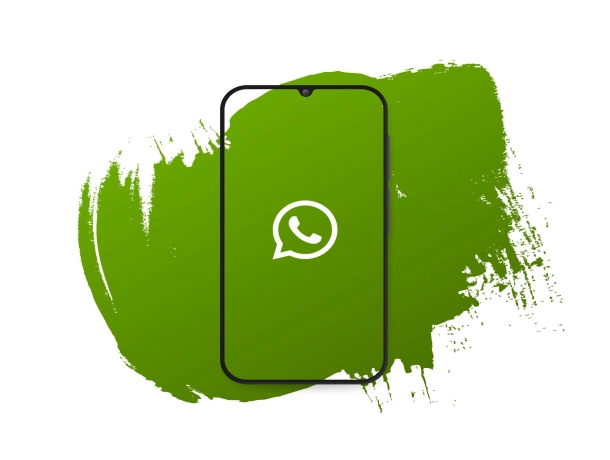
- August 17, 2023
- advertising and marketing, branding
- Digital Marketing
What is WhatsApp Marketing?
Whatsapp marketing is the practice of using a messaging app to connect with new clients, it helps with advertising goods or services and raising brand awareness. The guide to WhatsApp marketing reaches out to a target audience and engages them with personalised and interactive marketing by using WhatsApp services like text messaging, voice and video conversations and media sharing.
WhatsApp marketing can take many different forms, such as sending mass messages to a list of contacts, automating conversations with chatbots, setting up groups for community development or customer service, and launching advertising campaigns utilizing the WhatsApp Business API.
Due to the widespread usage of WhatsApp worldwide and the fact that it offers a direct and individualised line of connection with customers, it is a well-liked marketing tactic for companies of all sizes. It’s crucial to abide by WhatsApp’s terms of service and privacy policy, as well as to get recipients’ permission before sending marketing messages.
WhatsApp Business API
Businesses can communicate with their clients on WhatsApp at scale thanks to the WhatsApp Business API.
- The WhatsApp Business API is currently only accessible to a small number of companies, and there are stringent criteria and requirements that companies must adhere to utilise it. Before using the API, businesses must apply for access to it and receive WhatsApp’s approval. Businesses must also adhere to WhatsApp’s rules and regulations for messaging on the network, including getting users’ explicit consent before sending them promotional messages.
- According to a price structure that varies by nation and message type, WhatsApp charges businesses for utilising the API. Companies must pay for each message they send. Depending on the country and the type, expenses per message can range from a few cents to a few dollars.
- Additionally, WhatsApp charges companies for accessing specific API capabilities like building messaging templates or utilising chatbots. Depending on the complexity of the integration and the desired level of support, the price for these features may change.
- The WhatsApp Business API enables companies to develop messaging templates that have already been approved for use in particular situations, such as order updates, appointment reminders, and account verifications. Businesses can send communications at scale while yet preserving a personal touch by customising these templates with user-specific information.
- All team members have access to a common email through the Team Inbox, which enables teamwork and centralised management of client inquiries and orders.
- While the WhatsApp Business app is free for small enterprises, it’s crucial to remember that the WhatsApp Business API is designed for larger businesses with more complex communication requirements. Businesses must apply for access to the WhatsApp Business API and satisfy specific criteria, such as having a Facebook Business Manager account and a dedicated phone number for WhatsApp conversations.
WhatsApp Business App:
A free mobile app created by WhatsApp exclusively for small and medium-sized enterprises is called the WhatsApp Business App. The application offers a number of functions that can assist businesses in contacting their clients via WhatsApp, such as
- Business Profile: Organizations can set up a WhatsApp profile for their business, which can include details like their name, a brief description, an email address, and a website. As a result, clients may more easily identify and connect with platform-based businesses.
- Messaging Tools: The app offers messaging tools that can assist businesses in controlling their WhatsApp client interactions. Businesses can, for instance, send up automatic messages to welcome consumers who message them after hours or develop fast answers to frequently asked issues.
- Labelling and filtering of communications: The programme enables companies to label and categorise their messages, making it simpler to keep track of client enquiries and orders.
- Catalogue: Companies can upload a list of their goods or services to WhatsApp to make it simpler for customers to explore and place orders.
- WhatsApp Web: When used in conjunction with the app, WhatsApp Web enables businesses to handle client communication from a desktop computer.
Small and medium-sized businesses may find the WhatsApp Business App to be a helpful tool for communicating with their clients on WhatsApp. It’s crucial to keep in mind, though, that the app has limits in comparison to the WhatsApp Business API, which is built for bigger companies with more intricate communication requirements.
| WhatsApp Business App | WhatsApp Business API |
| For small enterprises | For medium and large enterprises |
| Sends manual notifications and updates | Sends automated notifications and updates |
| Doesnt integrate third party solutions to API | Integrates third party solutions to API |
| Designed to manage a smaller volume of messages | Designed to manage a large volume of messages |
| Free support | Chargeable support |
| Can’t support unlimited users and devices | Can support unlimited users and devices |
Difference between normal WhatsApp and business WhatsApp
WhatsApp Business is a version of the popular messaging service designed specifically for businesses. It offers a number of capabilities not found in WhatsApp’s normal edition, such as the option to build a business profile, automated messaging, and in some nations, even payment processing. The main distinctions between regular WhatsApp and WhatsApp Business are as follows:
- Business profile: With WhatsApp Business, you may make a special profile for your business that includes the name of your organisation, its address, a link to its website, and its operating hours. This makes it simple for customers to find and get in touch with your company.
- Automated messages: WhatsApp Business enables you to create automated messages, including greetings or short answers to frequently asked inquiries. You can do this to aid you and save time.
- Labels: In WhatsApp Business, labels can help you organise your discussions and keep tabs on client questions, orders, and other crucial details.
- Payment processing: WhatsApp Business enables in-app payment processing in select countries. Customers may pay for goods and services more easily as a result, which helps speed up your sales process.
In general, WhatsApp Business is made to make it simpler for companies to engage with their clients and deliver a more individualised experience. Many services it provides can help you save time, enhance customer service, and expand your organisation.
Guide to WhatsApp marketing

Due to WhatsApp’s ongoing expansion and popularity, marketing for WhatsApp will be crucial in 2023. One of the most popular messaging apps in the world as of 2022, WhatsApp had over 2 billion active users globally. Businesses now have a fantastic opportunity to interact with clients on a platform that they are currently using and familiar with.
WhatsApp also has a number of capabilities, like the capacity to transmit text messages, audio and video conversations, photos, and videos, that make it perfect for marketing initiatives. This makes it possible for businesses to produce personalised and interesting content that can increase consumer loyalty and brand exposure.
Furthermore, WhatsApp Marketing can assist companies in reaching a larger audience and boosting revenues in light of the growing trend towards digital communication and e-commerce. With the WhatsApp Business API, for instance, companies can use WhatsApp to facilitate transactions as well as provide product updates and promotions and offer customer support.
Types of WhatsApp Marketing
Businesses can utilise a variety of WhatsApp marketing strategies to connect with existing clients and attract new ones. Types of WhatsApp marketing include
- Broadcast Lists: This entails sending the same message to a number of contacts who have chosen to receive communications from the company. Sending updates, reminders, and promotional messages are all advantageous in this situation.
- Chatbots: Bots that can be trained to respond to typical customer interactions and questions are known as chatbots. This can help organizations save time and money while still offering clients prompt, effective service.
- Whatsapp group: Using a shared chat room, members of a WhatsApp group can speak with one another. Companies might establish groups to serve customers, foster communities, or advertise their goods and services. With the use of the premium WhatsApp Business API service, companies may incorporate WhatsApp into their current customer relationship management (CRM) platforms. Because of this, businesses may automate their communications and transactions and give customers more individualised service.
- Sponsored messages: These are paid advertisements that show up in user chats. Companies can advertise their goods or services to a specific audience by using sponsored messaging.
Benefits of WhatsApp Marketing

Whatsapp marketing can be beneficial in a number of ways. Some of the important advantages include.
- Whatsapp enables companies to have direct and personal communication with their customers or clients. This will strengthen the bonds between the client and the company and result in boosting client loyalty.
- Whatsapp enables you to have high engagement rates as Whatsapp users are expected to review and reply to messages they receive through the app.
- WhatsApp Marketing, particularly for small and medium-sized businesses, can be a cost-effective way for businesses to reach their audience when compared to traditional marketing techniques.
- Businesses can save time and resources with automated communications through customer support with chatbots and WhatsApp business API.
- WhatsApp gives companies the ability to offer quick and effective customer help, answering questions and resolving problems in real-time.
- Using WhatsApp Marketing, companies can direct their messaging to particular audiences, ensuring that the correct people hear what they have to say.
Examples of WhatsApp Marketing
Whatsapp marketing can be used by companies to advertise their goods, services or brands in various ways. Some examples of WhatsApp marketing include
- WhatsApp can be used by businesses to offer customer care. Consumers can submit their inquiries and get a real-time response to their queries.
- Companies can use WhatsApp to advertise their goods and services by sending out messages with deals, discounts, and various special offers.
- Companies can use WhatsApp to share teasers and sneak peeks to build anticipation for the launch of their new product.
- Companies can utilize WhatsApp to conduct customer surveys and obtain feedback for their services.
- Companies can utilize WhatsApp to engage with their devoted clients by providing them with exclusive discounts and benefits.
- Based on their past purchases companies can send customized messages through WhatsApp.
- Companies can use WhatsApp to send out newsletters to their clients and keep them informed about the newest goods, services, and information.
- Companies may utilize WhatsApp to develop games and contests to engage customers and raise brand recognition.
How to design a WhatsApp Marketing strategy for your business
Planning and carrying out a thoughtful WhatsApp marketing strategy for your company is essential. The following stages will assist you in creating an effective WhatsApp marketing plan:
- Choose your target audience: You must determine your target demographic before developing a WhatsApp marketing strategy. To develop persuasive communications that appeal to your target audience, you must comprehend their demographics and preferences.
- Establish specific objectives: You should specify specific objectives for your WhatsApp marketing strategy. The key performance indicators (KPIs) you’ll use to gauge the effectiveness of your campaign should be determined.
- Create a message plan: You need to create a message plan outlining the different kinds of messages you’ll be sending to your clients. These communications ought to be pertinent, unique, and interesting.
- Develop your subscriber list: You should encourage clients to opt-in to receive messages from your company to build your subscriber list. On your website, in your email signature, and on your social media accounts, you can advertise your WhatsApp number.
- Use automation tools: You may manage your WhatsApp Marketing campaign using automation technologies. You can track your KPIs, segment your subscriber list, and plan communications using these tools.
- Follow up on your results: You need to follow up on the outcomes of your WhatsApp marketing campaign. You can modify your campaign to increase its effectiveness.
- Follow WhatsApp policies: You need to make sure that your WhatsApp marketing strategy follows the WhatsApp guidelines. This includes securing client approval, Obtaining consumer consent, abstaining from spamming, and not sending messages with objectionable content are all examples of this.
Whatsapp business marketing in 2023
Whatsapp marketing has grown tremendously these years the companies have started using WhatsApp marketing strategies for their goods or services.
- Businesses may use WhatsApp to offer real-time customer care, which can help them forge stronger bonds with their clients. Companies can utilise WhatsApp to swiftly and effectively provide help, respond to inquiries, and solve problems.
- Companies can utilise WhatsApp to deliver their clients special offers and promotions. Customers may be encouraged to buy products and develop a sense of loyalty as a result.
- Customers can receive product updates and announcements via WhatsApp. This can assist companies in informing customers about new features, products, and other vital news.
- Businesses may use WhatsApp to give clients tailored messages, which can help them forge closer bonds with their audience.
- Companies can set up group chats on WhatsApp to promote communication and collaboration among staff members, business partners, and clients.
How to reach the target audience on WhatsApp?
You need to use WhatsApp strategically to reach your target audience. These techniques can help you connect with your target audience on WhatsApp and foster closer relationships with them. To avoid any unfavourable outcomes, always adhere to WhatsApp’s policies and guidelines for marketing reasons.
- Create a contact list: Create a list of contacts for your target market first. This can be accomplished by requesting clients opt-in for your WhatsApp marketing campaign or by providing rewards like discounts or access to special content. Once you have a contact list, divide your audience into groups based on their characteristics, interests, and behaviour. You can then modify your communications to meet the particular requirements and preferences of each group.
- Customize your messages: To engage your audience more emotionally, use individualised communications. When communicating with them, use their first names and address them by their requirements and preferences.
- Deliver useful and relevant content: Share stuff that will improve the lives of your readers. Refrain from bombarding them with pointless or irrelevant promotional messages.
- Employ WhatsApp business features: To improve customer service and streamline communication, use WhatsApp Business features like automated messages, rapid replies, and labels.
- Use WhatsApp to provide top-notch customer support: WhatsApp may be used to deliver top-notch customer support. Quickly respond to inquiries and assist clients in finding rapid solutions to problems.
- Analysis and Campaign Optimization: Analyze the results of your WhatsApp marketing campaign with analytics. Examine your outcomes and adjust your campaign in light of what is effective.
Growth of WhatsApp marketing strategies
With more than 2 billion monthly active users, WhatsApp is one of the most popular messaging services in the world. As a result, it serves as an excellent platform for companies to use customised marketing techniques to connect with potential clients. In recent years, WhatsApp has worked to enhance its business capabilities, which now include automated messaging, the option to create a business profile, and even payment processing in select nations.
These features let companies interact with clients and offer a more individualised experience. In the future, more companies will likely incorporate WhatsApp into their overall marketing plans, especially in areas where the app is most widely used. This may entail sending customised messages or utilising chatbots to automate customer support. It’s also important to note that WhatsApp has been looking into additional revenue streams for the service, including advertising. This might create new chances for companies to connect with clients through relevant app-based advertising.
Overall, the WhatsApp marketing plan appears to have a bright future, especially as the service keeps introducing new features and extending its global reach.
Conclusion
WhatsApp offers a large opportunity for businesses to connect with and engage with their clients. Businesses can strengthen their interactions with their clients and spur future growth by utilising its features and functionalities. Guide to WhatsApp marketing is a successful strategy for companies to connect with customers where they are, foster relationships, and eventually spur business expansion. Ultimately, businesses may effectively communicate with their customers and market their brands by combining these several methods of WhatsApp marketing.
Guide to WhatsApp Marketing is a potent tool for companies wishing to connect directly and personally with their audience while offering prompt and effective customer support. You can create an effective WhatsApp Marketing strategy that engages your clients, increases brand recognition, and stimulates sales. It’s crucial to remember that companies using WhatsApp for marketing must adhere to its rules and regulations. When sending consumers promotional communications, this entails getting their express permission first. It also calls for making sure that all messages are pertinent and helpful to the user.












